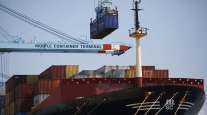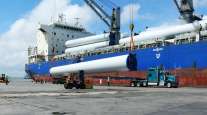US Steps Up Heat on Container Carriers to Ease Port Congestion

[Ensure you have all the info you need in these unprecedented times. Subscribe now.]
U.S. regulators stepped up the heat on ocean shipping companies and the seaport terminals some of them operate, seeking to smooth the disrupted flow of containers that are swamping America’s biggest ports and wreaking havoc on the nation’s strained supply chains.
The Federal Maritime Commission said it will order container carriers and port terminal operators servicing the Los Angeles and New York areas to “provide information on their policies and practices related to container returns and container availability for exporters.”
“Information received from parties receiving demands may be used as a basis for hearings, Commission enforcement action or further rule-making,” the FMC said in a statement Feb. 17, without identifying the companies it’s targeting.
Denmark’s A.P. Moller-Maersk A/S, which has an alliance with Geneva-based Mediterranean Shipping Co., is among the operators of terminals at the L.A. port, as is a unit co-operated by Taiwan’s Evergreen Marine Corp. France’s CMA CGM SA and China’s Cosco Shipping Holdings Co. are among the biggest lines calling on Long Beach. All of these companies appear on the Transport Topics Top 50 list of the largest global freight carriers.
RELATED: Intermodal Council Scores Win in Latest Round of Ongoing Case Against Ocean Carriers
A focus of FMC member Rebecca Dye’s probe is the practice used by some shipping lines and terminal operators of tacking on fees for late pickup or overdue returns of containers. Truckers have complained those are unfair in times of heavy congestion. Though the FMC announced rules last year restricting so-called demurrage and detention penalties during periods of bottlenecks, Dye has said there hasn’t been universal adherence.
The FMC has four other members and an enforcement bureau that prosecutes violations of the nation’s shipping laws, administers civil penalties such as fines and negotiates settlements.
On Feb. 17, officials in Los Angeles said they plan to divert cargo ships to other destinations because of a backlog of vessels anchored outside the port, some waiting more than a week to berth. Neighboring ports in Seattle and Tacoma, Wash., have indicated they have spare capacity to help ease logjams on the West Coast.
Want more news? Listen to today's daily briefing below or go here for more info:




